National Forum on Youth Violence Prevention Working Session 2011
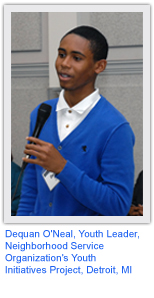
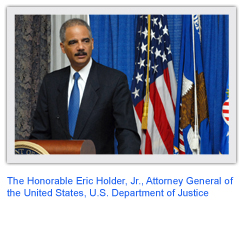 Representatives from Boston, Chicago, Detroit, Memphis, Salinas, and San Jose gathered in Washington, DC on October 31 and November 1, 2011 for the National Forum on Youth Violence Prevention Working Session. The Forum is a collaboration between the U.S. Departments of Justice, Education, Health and Human Services, Housing and Urban Development, Labor, and the Office of National Drug Control Policy. The Working Session brought together a diverse group of participants involved in the local youth violence prevention efforts in each city along with federal staff, researchers, and experts. Dequan O’Neal, a Youth Leader from the Neighborhood Service Organization’s Youth Initiatives Project in Detroit, MI, also participated in the meeting.
Representatives from Boston, Chicago, Detroit, Memphis, Salinas, and San Jose gathered in Washington, DC on October 31 and November 1, 2011 for the National Forum on Youth Violence Prevention Working Session. The Forum is a collaboration between the U.S. Departments of Justice, Education, Health and Human Services, Housing and Urban Development, Labor, and the Office of National Drug Control Policy. The Working Session brought together a diverse group of participants involved in the local youth violence prevention efforts in each city along with federal staff, researchers, and experts. Dequan O’Neal, a Youth Leader from the Neighborhood Service Organization’s Youth Initiatives Project in Detroit, MI, also participated in the meeting.
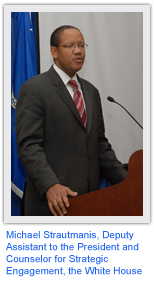 Over the course of the two days, Working Session attendees participated in panel discussions, presentations, and facilitated discussions where they discussed the implementation of the cities’ comprehensive plans to prevent and reduce youth violence. The conference began with opening remarks by Assistant Attorney General Laurie Robinson and Attorney General Eric Holder, who emphasized the importance of interagency coordination in the Forum’s efforts. The Forum cities’ comprehensive plans blend prevention, intervention, enforcement, and reentry and focus on multi-disciplinary partnerships, balanced approaches, and data-driven strategies to ensure that cities address the wide range of factors associated with youth violence.
Over the course of the two days, Working Session attendees participated in panel discussions, presentations, and facilitated discussions where they discussed the implementation of the cities’ comprehensive plans to prevent and reduce youth violence. The conference began with opening remarks by Assistant Attorney General Laurie Robinson and Attorney General Eric Holder, who emphasized the importance of interagency coordination in the Forum’s efforts. The Forum cities’ comprehensive plans blend prevention, intervention, enforcement, and reentry and focus on multi-disciplinary partnerships, balanced approaches, and data-driven strategies to ensure that cities address the wide range of factors associated with youth violence.
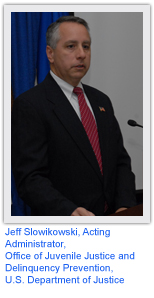 Michael Strautmanis, Deputy Assistant to the President and Counselor for Strategic Engagement at the White House, who is charged with leading the Forum Steering Committee, expressed his and the President’s deep appreciation for the commitment and the hard work that everyone at the local and federal level has given to this effort of preventing youth violence. He also mentioned the President’s plan to pass the American Jobs Act as a way to get more youth and families back to work and reduce the strain on local economies that are overwhelmed with high unemployment numbers.
Michael Strautmanis, Deputy Assistant to the President and Counselor for Strategic Engagement at the White House, who is charged with leading the Forum Steering Committee, expressed his and the President’s deep appreciation for the commitment and the hard work that everyone at the local and federal level has given to this effort of preventing youth violence. He also mentioned the President’s plan to pass the American Jobs Act as a way to get more youth and families back to work and reduce the strain on local economies that are overwhelmed with high unemployment numbers.
Jeff Slowikowski, Acting Administrator for the Office of Juvenile Justice and Delinquency Prevention at the U.S. Department of Justice stressed the important role of youth and family engagement during his remarks. A panel on youth, family, and faith based partnerships further explored this issue and allowed participants to hear concrete examples of successful partnerships.
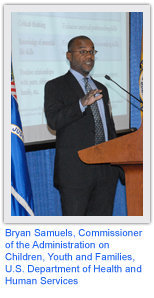 Each of the six cities involved in the Forum presented an update on the implementation of their plans and challenges they’ve encountered. Information sharing was a common challenge across the cities, as was securing funding and deepening diverse partnerships throughout the community. Panel presentation throughout the two day Working Session highlighted tools for successful multi-disciplinary partnerships, data-driven strategies, a status report on the assessment of the Forum, and resources available to all cities working to reduce and prevent youth violence: CrimeSolutions.gov, youth.gov, and the National Reentry Resource Center.
Each of the six cities involved in the Forum presented an update on the implementation of their plans and challenges they’ve encountered. Information sharing was a common challenge across the cities, as was securing funding and deepening diverse partnerships throughout the community. Panel presentation throughout the two day Working Session highlighted tools for successful multi-disciplinary partnerships, data-driven strategies, a status report on the assessment of the Forum, and resources available to all cities working to reduce and prevent youth violence: CrimeSolutions.gov, youth.gov, and the National Reentry Resource Center.
Bryan Samuels, Commissioner of the Administration on Children, Youth and Families at the U.S. Department of Health and Human Services’ Administration on Children and Families, discussed the similar challenges faced by youth involved in the child welfare system and youth affected by violence, as well as the importance of considering trauma histories when working with vulnerable youth. A panel of federal agency partners from the U.S. Departments of Labor, Education, Health and Human Services, Housing and Urban Development, and Justice further highlighted the importance of considering the needs of youth across the developmental spectrum.
 The Working Session allowed the city teams to explore various intervention and enforcement approaches. The participants viewed the film The Interrupters and engaged in a discussion with Gary Slutkin, Executive Director of CeaseFire. A panel on various intervention and enforcement approaches currently in use in Baltimore, Cincinnati, and Los Angeles expanded the conversation on real-world implementation, replication, and adaptation of nationally recognized models.
The Working Session allowed the city teams to explore various intervention and enforcement approaches. The participants viewed the film The Interrupters and engaged in a discussion with Gary Slutkin, Executive Director of CeaseFire. A panel on various intervention and enforcement approaches currently in use in Baltimore, Cincinnati, and Los Angeles expanded the conversation on real-world implementation, replication, and adaptation of nationally recognized models.
Bernard Melekian, the Director of the Office of Community Oriented Policing Services at the U.S. Department of Justice closed the meeting with remarks focused on the importance of appropriate law enforcement responses in the cities involved in the Forum, as well as the need for the cities to share their lessons learned with others communities interested in working to prevent and reduce youth violence in their communities.
The Attorney General blogged about the Forum on the U.S. Department of Justice website after the meeting. To learn more about the Working Session, view the agenda and visit the photo gallery. Learn more about youth violence prevention by visiting the Forum’s website.
Power Points for the Youth Violence Forum Page
Presentations from the National Forum on Youth Violence Prevention Working Session
| Time | Presentation |
|---|---|
| Monday, 10/31/2011 | |
|
10:30 AM |
Federal Coordination Team – Agency Implementation Updates Panelists from the federal agencies comprising the Forum’s Federal Coordination Team (FCT) provided status updates for their agencies, including feedback from the Forum city site visits and overview of each agency’s Action Plan Maria Queen, HUD Liaison, Federal Interagency Youth Initiatives, U.S. Department of Housing and Urban Development Sarah Oberlander, Social Science Analyst, Office of the Assistant Secretary for Planning and Evaluation, U.S. Department of Health and Human Services Norris Dickard, Director, Health Students Group, Office of Safe and Health Students, U.S. Department of Education Eugene Schneeberg, Director, Faith-Based & Neighborhood Partnerships, U.S. Department of Justice Edna Primrose, National Director, Office of Job Corps, ETA, U.S. Department of Labor |
|
11:15 AM |
Preventing Youth Violence BEFORE It Starts: Youth Families and Faith-Based Partners Representatives from Memphis, TN and San Jose, CA detailed some of the successes and challenges they have had as they implement their respective cities’ initiatives to reduce and prevent youth violence San Jose--Action Collaboration Transformation (ACT): Mayor’s Gang Prevention Task Force Keith Norman, Pastor, First Baptist Church Broad, Memphis, TN |
|
1:45 PM |
Reducing Youth Violence Using Intervention and Enforcement: Three Approaches Representatives from Cincinnati, OH, Baltimore, MD, Los Angeles, CA, and Chicago, IL provided an overview of their violence reduction and prevention programs, including the principles, successes, challenges, outcomes, and evaluation of each program Chicago, Illinois – Anti-Violence and Community Stabilization Programs S. Gregory Baker, former Executive Director Lori Toscano, Acting Director, Safe Streets, Baltimore City Health Department Guillermo Cespedes, Deputy Mayor, Gang Reduction and Youth Development, City of Los Angeles
|
| Tuesday, 11/01/11 | |
|
8:45 AM |
The Importance of Multi-Disciplinary Partnerships for Success Representatives from Boston, MA, Salinas, CA, and Detroit, MI provided an overview of their cross-agency/cross organizational violence reduction and prevention programs, including the strategies behind the programs, successes and challenges, and next steps that will be taken to continue the efforts City of Boston’s Youth Violence Prevention Plan City of Detroit Youth Violence Prevention Initiative The Honorable Dennis Donahue, Mayor, Salinas, CA Stewart Sarkozy-Banoczy, Philanthropic Research Initiatives, Office for International and Philanthropic Innovation, U.S. Department of Housing and Urban Development |
|
10:30 AM |
Data Driven Strategies: Opportunities and Challenges for Multi-Disciplinary Partnerships Representatives from multiple governmental agencies, universities, and research organizations presented on the importance of incorporating data and research into the development of prevention programs. A presentation was also conducted on HIPAA guidelines in research. Bryan Samuels, Commissioner John Markovic, Senior Social Science Analyst, Office of Community Oriented Policing Services (COPS), U.S. Department of Justice Dennis Culhane, Dana and Andrew Stone Chair in Social Policy, University of Pennsylvania Iliana L. Peters, Health Information Privacy Specialist, Office for Civil Rights, Department of Health and Human Services Edmund McGarrell, Director, School of Criminal Justice, Michigan State University |
|
2:30 PM |
Understanding Reentry as More Than a Public Safety Issue This presentation provided an overview of the objectives, approach, and technical Assistance provided by the National Reentry Resource Center. The presentation also covered The Department of Justice’s Office of Juvenile Justice and Delinquency Prevention’s (OJJDP)programs focused on re-entry, federal funding opportunities for re-entry, working groups focused on the issue, and federal resources on the topic. Le’Ann Duran, Director, National Reentry Resource Center Tom Murphy, State Representative, Office of Juvenile Justice and Delinquency Prevention, U.S. Department of Justice |
